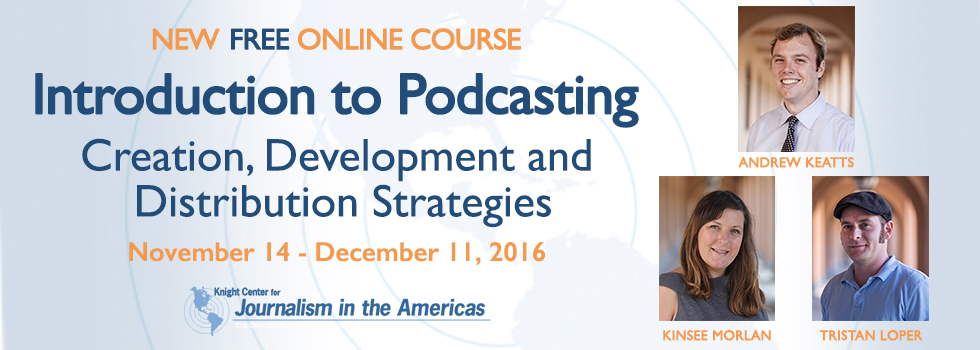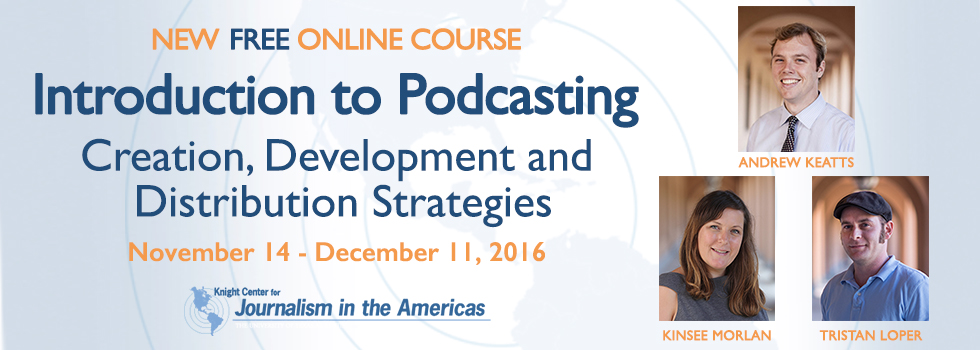
Podcasting is having its heyday. The medium allows for users around the world to tune into their favorite programs, on topics ranging from fantasy football to foreign policy, at any time of the day or night.
The Infinite Dial 2016 study estimated that 57 million Americans listened to podcasts in the last month. Additionally, podcast advertising spending in the U.S. is expected to reach US $395 million by 2020, according to Bridge Ratings.
What once started as an oft-overlooked medium has become ore sophisticated in terms of content and business model. As Ken Doctor noted in September for Nieman Lab, “We can mark 2016 as the year the podcast business came of age.”
With this in mind, the Knight Center is offering its first course on podcasting. The four-week course “Introduction to Podcasting: Creation, Development and Distribution Strategies,” will take place from November 14 to December 11, 2016. Registration is now open.

The free massive open online course (MOOC) will be taught by three instructors from the Voice of San Diego (VOSD): Andrew Keatts, Kinsee Morlan and Tristan Loper. VOSD is a digital nonprofit investigative news organization based in California. Keatts, Morlan and Loper are the producers of VOSD’s podcasts, which look at news, education elections and arts.
“This introductory course will help the curious understand what it takes to produce their own show,” Loper said. “It will cover the basics, as well as best practices and lessons learned from a journalism perspective. It will also cover technical aspects for those ready to dive in.”
The Knight Center course is tailored to journalists and media practitioners, but is open to anyone wanting to start a podcast.
The course will provide an introduction to the medium; review different formats like storytelling and talk show styles; teach how to plan and script episodes; go over technical aspects of production; and cover marketing and best practices for audio recording.
For instructor Kinsee Morlan, “Podcasts forge a deeper connection with audiences and open up a new channel to talk about issues in-depth and in a more engaging way.”
Andrew Keatts agreed: “There’s a personal connection that makes the audience more engaged. This creates an opportunity to get stories out there that might otherwise never get heard — and to have discussions with people who might respond differently to a print article.”
The course is divided into four weekly modules and each weekly lecture will be delivered in the form of a podcast discussion. The lessons will feature interviews with podcast producers from a variety of outlets.
Each week features lectures, readings, a quiz and discussion on the Knight Center’s distance learning platform, JournalismCourses.org. This course is asynchronous – which means students can login to the course site and complete these class activities throughout the week at their own pace, anytime. However, there are recommended weekly deadlines to keep students on pace.
Certain audio equipment will be discussed during the course, but is not required. Any student interested in obtaining equipment for the course can find more instructions on the course website.
“We agree with Ken Doctor: 2016 has been the year of Podcasts, although not many people have realized that. The data about the growing audience and the solid revenue stream generated by podcasts in the United States show that this format has come to an age, so we think this MOOC will be very useful for journalists and anyone who has just started a podcast or intends to launch one,” said professor Rosental Alves, founder and director of the Knight Center. “We are happy to have as instructors a team of professionals who have been producing great podcasts in San Diego, so they have first-hand experience with the dos and don’ts of this format.”
As with all Knight Center MOOCs, participation is free. However, students can pay an administrative fee of US $30 for a certificate of completion. The certificate is available for download in PDF format after the Knight Center completes a review process to ensure the student met the requirements. No formal college credit is associated with this certificate.
The Knight Center for Journalism in the Americas was created in 2002 by Professor Rosental Alves, Knight Chair in Journalism and UNESCO Chair in Communication at the School of Journalism at the University of Texas at Austin. The Knight Center’s distance learning program continues with support from the John S. and James L. Knight Foundation, the Moody College of Communication at the University of Texas and other donors; as well as income from registration fees and the issuance of certificates. Since 2012, the MOOCs and other online journalism courses from the Knight Center have reached more than 80.000 people from 169 countries.

Knight Center for Journalism in the Americas
300 West Dean Keeton
Room 3.212
Austin, TX, 78712
Phone: 512-471-1391
Email: journalismcourses@austin.utexas.edu